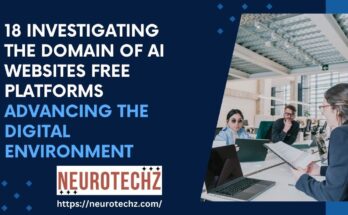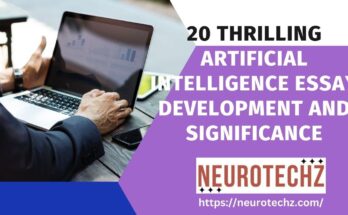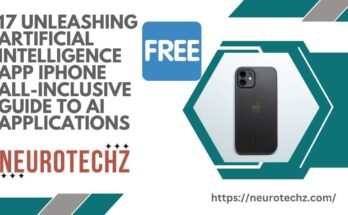Artificial Intelligence Books With its ability to disrupt entire industries
Impact everyday life, and push the limits of human potential, artificial intelligence (AI) is becoming a powerful force. Extensive resources are required to meet the growing need for comprehending artificial intelligence. Here, we explore the best choices for readers with varying interests and levels of competence in the field of fake intelligence books.
Life 3.0 Max Tegmark’s Being Human in AI
In “Life 3.0,” Max Tegmark muses about artificial intelligence’s future and how it might affect people. About general Artificial Intelligence Books delve into existential and ethical issues, pushing readers to think about the societal ramifications and duties that come with building sentient technologies.
Bostrom, Nick. Superintelligence Paths, Dangers, Strategies
Nick Bostrom does research on the potential and dangers of creating superintelligent machines. To provide readers with a provocative understanding of the difficulties we might encounter in the future, “Superintelligence” investigates situations in which Artificial Intelligence Books surpasses human intelligence and the possible ramifications.
David L. Poole and Alan K. Mackworth publish AI Foundations of Computational Agents.
This book provides an extensive introduction to intelligent agents’ computational and mathematical underpinnings for those looking for a more technical grasp of Artificial Intelligence Books. From probability theory to decision theory, the authors empower readers with the tools essential for a thorough dive into the fundamental principles of artificial intelligence.
By Margaret A. Boden, AI A Very Short Introduction
A thorough review of artificial intelligence’s philosophy, history, and current status can be found in Margaret A. Boden’s succinct yet perceptive work. This book provides a thorough overview of AI’s development and societal effects, making it ideal for readers who want to comprehend the basics without becoming bogged down in technical intricacies.

by Nils J. Nilsson, Artificial Intelligence: A New Synthesis
By integrating historical insights and current advancements, Nils J. Nilsson offers a thorough Artificial Intelligence Books synthesis. The book covers a wide range of topics, including problem-solving, learning, and perception, making it excellent for students, researchers, and anybody wanting to understand the breadth of AI.
Stuart Russell Human-Compatible AI and Control
In his work “Artificial Intelligence: A Modern Approach,” co-author Stuart Russell delves into integrating AI systems with human values. Besides discussing the possible hazards and ethical issues associated with unchecked AI growth, “Human Compatible” explores the difficulties of guaranteeing that intelligent computers behave in ways that advance humanity.
Computational Agents and AI Foundations” by David L. Poole and Alan K. Mackworth
A thorough overview of the basic ideas of artificial intelligence is given in this textbook. It is an excellent resource for professionals and students looking for a strong foundation in Artificial Intelligence Books (AI) because the writers stress the computational components of the discipline while covering subjects like perception, learning, and reasoning.
Knowledge of Machine Learning
Before comprehending how AI and PDF work together, it is essential to grasp their underlying ideas. Artificial intellect replicates human intellect in machines, allowing them to carry out tasks that generally require human intelligence. Comprehension of language, learning, reasoning, and problem-solving are all included.
The PDF’s Development
Adobe created PDFs at the beginning of the 1990s to exhibit documents reliably across many platforms and devices. Documents, forms, and multimedia are frequently sent using PDF, which has developed into a global file format. Although PDFs are widely used, problems have been reported with data processing, accessibility, and content extraction.
Text Understanding AI-powered
Among AI’s most remarkable uses in the PDF space is text recognition. Machines can now recognize and extract text from scanned documents or photos thanks to a subset of artificial intelligence called optical character recognition, or OCR. This enhances PDF searchability in addition to quickening content indexation.
Categorization of Perceptive Documents
AI algorithms are being used more and more for intelligent PDF document classification. Users will find organizing and retrieving information easier when these algorithms automatically categorize papers based on their contents. This holds special significance for sectors like law, healthcare, and finance that handle copious amounts of paperwork.
Better Data Recovery and Interpretation
Extracting structured data from unstructured PDFs is a skill that AI technologies excel at. By employing machine learning algorithms, enterprises may automate data extraction procedures, decreasing manual labour and avoiding errors. In addition, Artificial Intelligence Books powered analytics enable decision-makers with useful information gleaned from PDF data.
PDFs with Natural Language Processing (NLP) Integration
The study of how computers and human language interact is the subject of NLP, a subfield of AI. Machines can comprehend, analyze, and produce text resembling human writing when using NLP with PDFs, and enhancing understanding and context analysis is especially helpful in obtaining relevant information from textual content in PDFs.

Analyzing and redacting smartly
AI-based solutions have revolutionized the methods for editing and annotating PDFs. Collaboration and feedback procedures can be streamlined by using these tools, which can intelligently highlight, underline, or comment on parts of a text. Further improving document security is AI-driven redaction, ensuring sensitive material is automatically recognized and hidden.
Inclusivity and Availability
Artificial intelligence is essential in improving PDF accessibility for people with disabilities; Artificial Intelligence Books guarantees that PDF material is inclusive and complies with accessibility standards using sophisticated text-to-speech technology and adaptive reading interfaces. It also promotes a more inclusive and diversified user experience in compliance with legal regulations.
Next innovations and trends
The amalgamation of AI and PDFs is expected to progress as technology develops. Among the expected developments are predictive analytics, document security through blockchain integration, and form-filling process automation via artificial intelligence. Furthermore, the smooth assimilation of AI with cutting-edge technologies such as augmented reality has the potential to transform our interactions with PDF material completely.
The Artificial Intelligence Books Revolution in History
Examining AI’s past is necessary to comprehend the field’s current perspective. When the phrase “Artificial Intelligence” was first used in 1956, this multidisciplinary field officially began to emerge. Pioneers like Alan Turing laid the foundation for machine intelligence with their early studies on symbolic reasoning and problem-solving. However, progress remained gradual due to limited processing power and data availability.
AI started imitating human decision-making processes in the 1980s, transitioning toward knowledge-based and rule-based expert systems. The “AI winter”—a period of decreased funding and interest in AI research—was brought on by setbacks the discipline experienced despite its progressions. The development of machine learning and data-driven methodologies in the late 1990s and early 2000s, which gave AI fresh life, marked a breakthrough.
These days, deep learning and machine learning are used.
Machine learning and deep learning approaches have become the mainstays of the present AI paradigm. System predictions and judgments can be made without explicit programming thanks to machine learning, which helps systems identify patterns in data. Complex feature extraction and representation are made possible by deep neural networks, a neural network subset of machine learning with numerous layers.
The quantity of data and computer capacity is a significant factor driving the contemporary approach to AI. Artificial Intelligence Books systems can now analyze enormous datasets and derive meaningful insights due to the exponential expansion in data collection and storage combined with technology advancements. Advancements in speech recognition, computer vision, and natural language processing have resulted from this, among other fields.
Challenges and Ethical Issues to Consider
AI presents ethical questions and concerns even as it makes fantastic breakthroughs. There is a need to carefully examine issues related to AI algorithm bias, data privacy, and the possibility of employment displacement. Fairness and transparency are essential for AI systems to avoid perpetuating preexisting societal prejudices.
Rules and guidelines are becoming increasingly necessary to oversee AI technology’s creation and further application. To fully utilize AI’s promise for the greater good, balancing innovation and ethical issues is essential.
Implications and Opportunities for the Future
AI research is active in fields including explainable AI, quantum computing, and human-AI collaboration, and these topics show great potential for the field’s future. To solve issues with deep learning models’ “black box” status, explainable AI seeks to improve the transparency and interpretability of algorithms.
Artificial intelligence (AI) is a modern approach that might be significantly improved by quantum computing because of its parallel processing and problem-solving capacity. Machine learning algorithms can be advanced, and optimization problems can be solved in novel ways because of the interaction between quantum computing and Artificial Intelligence Books.
Collaborating with Artificial Intelligence Books to enhance human talents instead of supplanting them is an additional fascinating area of exploration. More inclusive and advantageous applications may result from incorporating AI into routine operations and emphasizing human-centric design.
Applications in All Sectors
Artificial intelligence (AI) is a modern approach that disrupts traditional procedures and introduces novel solutions, and its impact is widespread across multiple industries.
Medications
Personalized medicine, drug development, and diagnostics are all being improved by Artificial Intelligence Books, which is completely changing healthcare. Healthcare research is moving more quickly thanks to machine learning algorithms that can evaluate medical pictures, forecast illness outcomes, and pinpoint viable treatments.
Monetary
Algorithmic trading, risk management, and fraud detection are three areas where Artificial Intelligence Books is employed in finance. Accuracy and efficiency are increased by machine learning models’ analysis of market trends, portfolio optimization, and automation of repetitive financial chores.
Making
Production processes are being revolutionized by Artificial intelligence-driven automation, which also lowers errors and boosts productivity. Machine learning-capable robots can adjust to shifting production conditions and allocate resources as efficiently as possible.
Buy
Personalized suggestions, demand forecasting, and supply chain optimization are ways Artificial Intelligence Books is changing the retail scene. Natural language processing-driven chatbots improve the purchasing experience by offering better customer support.
Knowledge
Education utilizes Artificial Intelligence Books to provide intelligent teaching systems, automated grading, and individualized learning experiences. Through machine learning, adaptive learning platforms may customize instructional materials to each student’s unique needs and learning style.
Summary
Accessible and thorough learning resources are becoming increasingly important as Artificial Intelligence Books develops. The works included in this article provide a range of perspectives on the concepts, uses, and ethical issues surrounding artificial intelligence, which appeal to a wide readership. These publications offer insightful viewpoints on artificial intelligence’s past, present, and future, regardless of your experience level. You may take a trip that broadens your comprehension of Artificial Intelligence Books’ complexities and significant effects on our world by losing yourself in the pages of these masterfully written publications.




